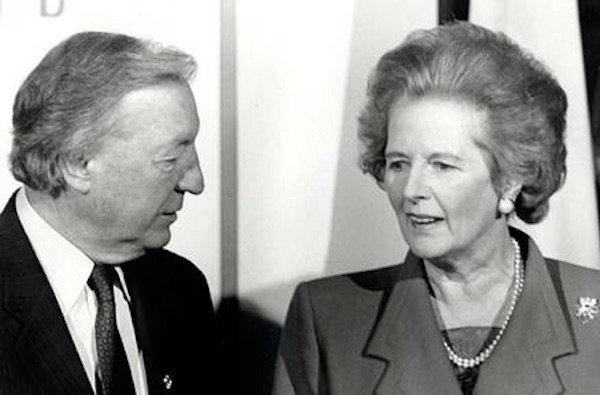
State papers released in Dublin have revealed how the late Taoiseach Charlie Haughey faced an assassination threat from MI5 while he was being brow-beaten by Margaret Thatcher into handing over wanted Irish republicans.
This year has once again seen the release of selected government papers in Dublin and London to reflect the events of 30 years ago.
Those released in Dublin show that in the aftermath of the signing of the 1985 Anglo-Irish Agreement, the Tories struggled with the Dublin government to remove the political offense exception for the extradition of IRA figures.
The move was the culmination of Thatcher’s efforts to criminalise the republican armed struggle, which in 1981 provoked the 1981 hunger strikes in which ten prisoners died.
Haughey’s initial reluctance to depart from international conventions infuriated Thatcher, who had signed up to the Anglo-Irish Agreement of 1985 in the belief the war in the north of Ireland would then be swiftly won through ‘security’ measures.
In one closely documented meeting by a civil servant in Copenhagen in late 1987, Thatcher raged at Haughey over perceived faults in legislation to end the political exception in the 26 Counties.
The transcript of the meeting in the Irish files was written by Cabinet secretary Dermot Nally, who said that Thatcher was furious over extraditions being thrown out of Irish courts “for all sorts of frivolous reasons”.
“I am very angry about all this,” she raged. “My feelings go deeper than anger.”
She added: “[Attorney General, Paddy Mayhew] tells me there may never be another extradition case again. I know now from what you told me that you have extreme difficulties with your people, but where are they living? They are going back to the Black and Tans - or is it 400 years ago?”
She said she did not have to sign the Anglo-Irish Agreement, which briefly gave the Dublin government an official say in northern affairs. “I could have got by without it,” she said -- possibly referring to the campaign of state-sanctioned killings of Irish republicans at the time.
Two months earlier, the Fianna Fail leader had himself been informed by the unionist paramilitary UVF that they had been provided by MI5 with details of his home, his island retreat and his yacht, for the purposes of assassination. A cowed Haughey responded to Thatcher with apologies and a promise to do better.
“I am sorry you feel so strongly,” he said. He said the state’s efforts to round up republicans was succeeding, but blamed his predecessor as Taoiseach for delays in extraditions going ahead.
“In the legal area, the political plea can no longer be used to prevent extradition,” he said. “I was left with that problem. If Garret FitzGerald had put through his legislation 12 months ago things would have been easier. There was 12 months’ delay when I came in.”
He added the Irish courts would be ‘straightened out’ to prevent further legal hold-ups in handing over IRA figures.
“It is no good if we can get them [republicans] but the process then breaks down,” he said. “What is more important than all this is the actual security co-operation on the ground.”
But it was not enough for Thatcher. “Why do I even try!” she moaned.
“Keep trying,” cooed Haughey. “You are one of the most able politicians.”
Haughey’s behaviour follows a tradition by Fianna Fail and Fine Gael leaders to British leaders, shown clearly in their personal communications to Thatcher.
After the British prime minister won her third election in 1987, Haughey wrote a charming letter to the British PM following her re-election.
It began: “Dear Margaret. Congratulations to you on your historic victory.
“From our position here, we see it as a well deserved tribute to your great personal qualities, particularly your skill and resolution.”
But his predecessor, Fine Gael leader Garret Fitzgerald, had sent a virtual love letter to the notorious murderess ahead of his own departure from office.
“It is not for me to comment on the domestic politics of Britain, but I think I am entitled to say that for Ireland’s sake I hope you are returned to power,” he declared. “I very much hope our paths will cross again.
![[Irish Republican News]](https://republican-news.org/graphics/title_gifs/rn.gif)
![[Irish Republican News]](https://republican-news.org/graphics/title_gifs/harp.gif)

